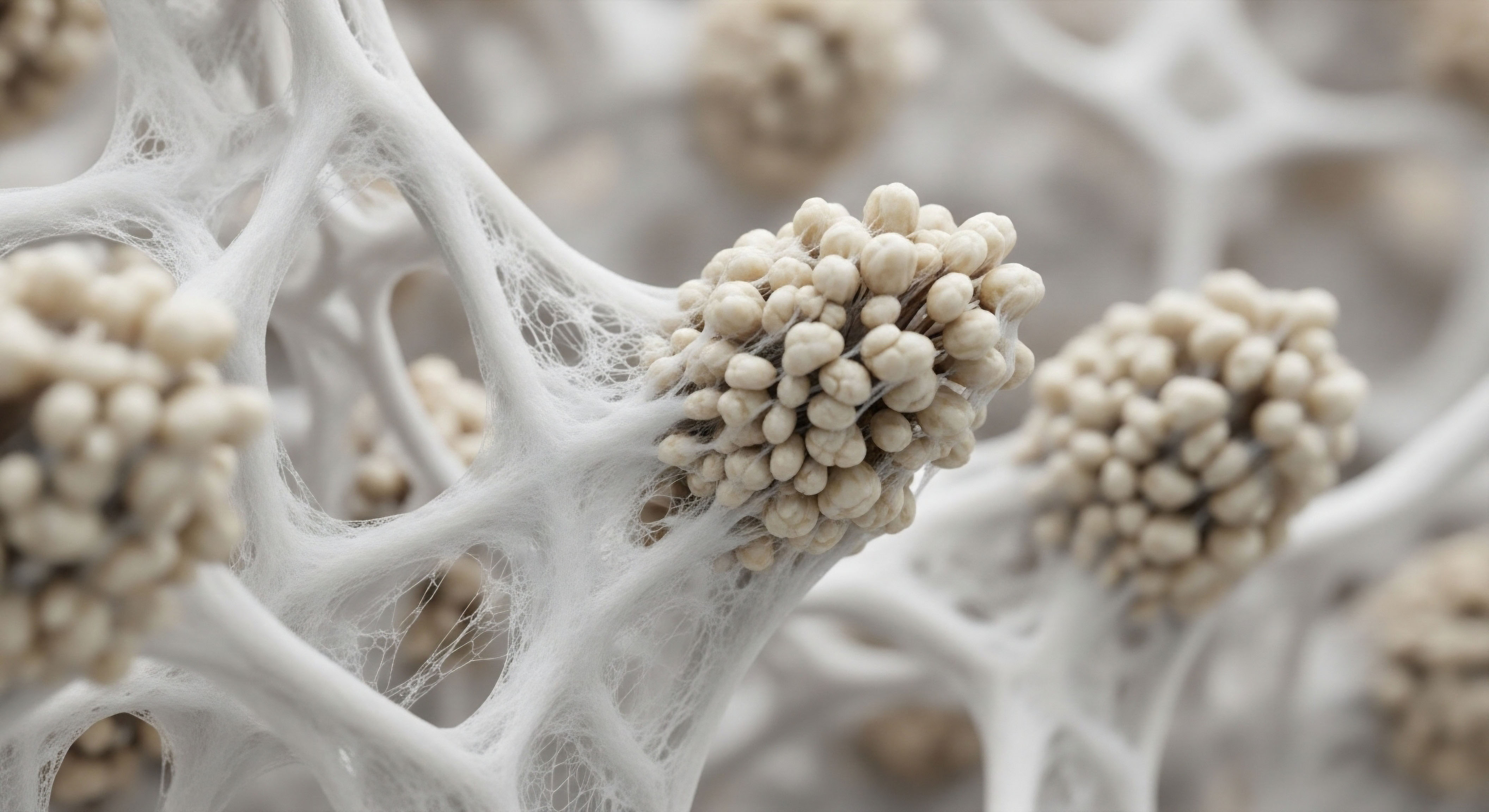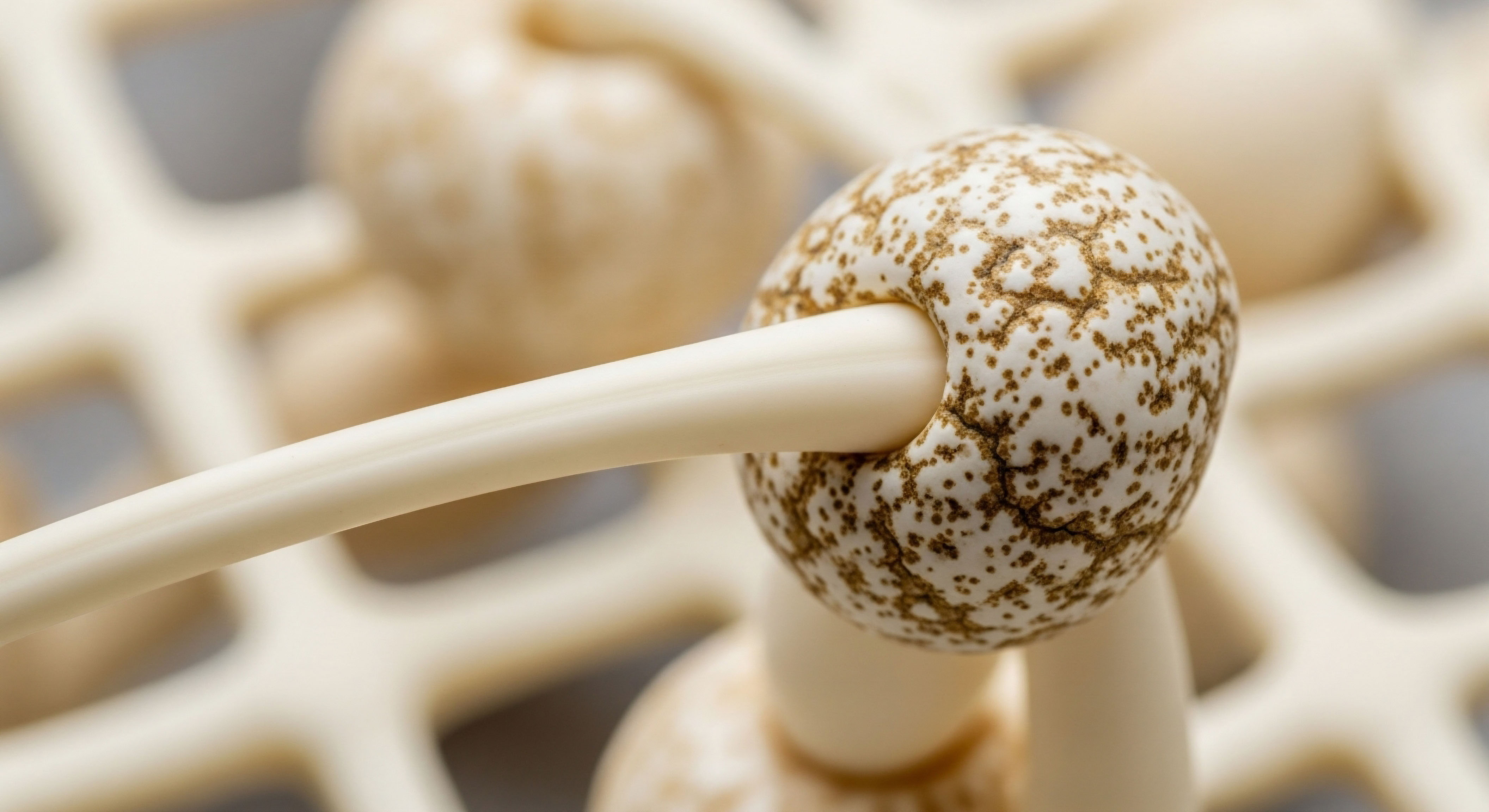

Fundamentals
Many individuals experience a subtle yet persistent shift in their well-being, a feeling that their internal equilibrium has been disrupted. Perhaps energy levels wane, sleep patterns become erratic, or body composition changes despite consistent efforts. These experiences are not merely signs of aging or daily stress; they often signal a deeper conversation occurring within the body, specifically within its intricate hormonal messaging network. Understanding this internal dialogue is the initial step toward reclaiming vitality and function.
The human body operates as a complex, self-regulating system, where hormones serve as vital chemical messengers. These substances, produced by endocrine glands, travel through the bloodstream to target cells, orchestrating a vast array of physiological processes. From regulating metabolism and mood to governing reproductive health and sleep cycles, hormones are the conductors of our biological symphony. When this orchestration falters, the effects are felt across every aspect of daily existence.

The Endocrine System and Its Influence
The endocrine system comprises a collection of glands that secrete hormones directly into the circulatory system. Key players include the thyroid, adrenal glands, pituitary gland, and gonads. Each gland produces specific hormones that exert far-reaching effects. For instance, the thyroid gland produces hormones that regulate metabolic rate, influencing energy production and body temperature.
Adrenal glands release cortisol, a stress hormone, which plays a role in glucose metabolism and immune response. The gonads, testes in men and ovaries in women, produce sex hormones such as testosterone, estrogen, and progesterone, which are central to reproductive health, bone density, and muscle mass.
Disruptions in this delicate hormonal balance can manifest as a variety of symptoms. For men, declining testosterone levels might lead to reduced libido, fatigue, or diminished muscle strength. Women experiencing perimenopause or post-menopause often report hot flashes, sleep disturbances, and mood fluctuations due to shifting estrogen and progesterone levels. These symptoms are not isolated incidents; they are signals from a system seeking recalibration.
Hormones serve as the body’s internal messaging system, orchestrating vital physiological processes that dictate overall well-being.

Dietary Foundations for Hormonal Balance
Dietary strategies represent a foundational element in supporting hormonal health. The foods consumed provide the building blocks for hormone synthesis and influence the pathways through which hormones are metabolized and utilized. A diet rich in whole, unprocessed foods supplies essential micronutrients, healthy fats, and quality proteins, all of which are indispensable for optimal endocrine function.
Conversely, diets high in refined sugars, unhealthy fats, and processed ingredients can contribute to systemic inflammation and metabolic dysregulation, creating an environment that hinders hormonal equilibrium.
Consider the role of specific macronutrients. Adequate protein intake provides amino acids, which are precursors for various hormones and neurotransmitters. Healthy fats, particularly monounsaturated and polyunsaturated fats, are critical for the synthesis of steroid hormones like testosterone and estrogen. Complex carbohydrates offer sustained energy and support stable blood glucose levels, preventing sharp insulin spikes that can disrupt hormonal signaling.

Macronutrient Roles in Endocrine Support
- Proteins ∞ Provide amino acids essential for hormone synthesis, including thyroid hormones and insulin.
- Healthy Fats ∞ Supply cholesterol, a precursor for steroid hormones such as testosterone, estrogen, and cortisol.
- Complex Carbohydrates ∞ Offer stable glucose release, helping to regulate insulin sensitivity and prevent metabolic stress.
- Fiber ∞ Aids in detoxification pathways, assisting the body in eliminating excess hormones and metabolic byproducts.
Micronutrients also play a significant, often overlooked, role. Vitamins such as D and B vitamins, along with minerals like zinc, magnesium, and selenium, act as cofactors in numerous enzymatic reactions involved in hormone production and metabolism. A deficiency in any of these can impede the body’s ability to produce or utilize hormones effectively. For instance, zinc is vital for testosterone production in men, while selenium is essential for thyroid hormone conversion.
Integrating dietary strategies with hormone optimization protocols involves more than simply eating “healthy.” It requires a precise, personalized approach that considers individual metabolic needs, existing hormonal imbalances, and the specific goals of any therapeutic intervention. This synergy ensures that the body receives the necessary nutritional support to respond optimally to targeted hormonal support, whether through lifestyle adjustments or clinical protocols.


Intermediate
Moving beyond foundational principles, the integration of dietary strategies with hormone optimization protocols becomes a precise endeavor, focusing on how nutritional choices directly influence the efficacy and safety of targeted interventions. These protocols, such as Testosterone Replacement Therapy (TRT) for men and women, or Growth Hormone Peptide Therapy, are designed to recalibrate specific biochemical pathways.
Dietary support acts as a crucial co-factor, preparing the body to receive and utilize these exogenous agents most effectively, while also mitigating potential side effects.

Dietary Support for Testosterone Optimization
For men undergoing Testosterone Replacement Therapy, dietary considerations extend beyond general wellness. The goal is to support healthy testosterone metabolism, manage estrogen conversion, and maintain overall metabolic health. Testosterone Cypionate, typically administered weekly via intramuscular injection, aims to restore physiological testosterone levels.
Gonadorelin, often prescribed alongside TRT, helps preserve natural testicular function and fertility by stimulating the hypothalamic-pituitary-gonadal (HPG) axis. Anastrozole, an aromatase inhibitor, is used to prevent excessive conversion of testosterone to estrogen, a common concern with exogenous testosterone administration.
Dietary interventions can significantly impact these processes. A diet that promotes stable blood sugar and insulin sensitivity helps prevent the chronic inflammation and metabolic syndrome often associated with lower testosterone levels and increased aromatase activity. Reducing refined carbohydrates and sugars, and prioritizing lean proteins and healthy fats, can help regulate insulin, which in turn influences sex hormone-binding globulin (SHBG) and free testosterone levels.

Nutritional Considerations for Male TRT
- Insulin Sensitivity ∞ Emphasize low glycemic index foods, lean proteins, and healthy fats to stabilize blood glucose and improve insulin response. This helps manage SHBG and free testosterone.
- Estrogen Metabolism ∞ Incorporate cruciferous vegetables (broccoli, cauliflower, Brussels sprouts) which contain indole-3-carbinol (I3C), a compound that supports healthy estrogen detoxification pathways.
- Liver Support ∞ Consume foods that aid liver function, such as leafy greens and sulfur-rich vegetables, as the liver plays a central role in hormone metabolism and clearance.
- Zinc and Magnesium ∞ Ensure adequate intake of these minerals, found in nuts, seeds, and red meat, as they are cofactors in testosterone synthesis and utilization.
For women, Testosterone Cypionate, often administered in lower doses (0.1 ∞ 0.2ml weekly via subcutaneous injection), addresses symptoms like low libido, fatigue, and mood changes. Progesterone, prescribed based on menopausal status, balances estrogen and supports uterine health. Dietary strategies here focus on supporting overall endocrine balance, managing inflammation, and ensuring optimal nutrient status for hormone synthesis and metabolism.
Targeted dietary strategies enhance the effectiveness of hormone optimization protocols by supporting metabolic health and modulating hormone metabolism.

Dietary Strategies for Female Hormone Balance
The female endocrine system is particularly sensitive to nutritional inputs. Supporting ovarian function, managing estrogen dominance, and promoting healthy progesterone levels are key.
| Dietary Focus | Rationale | Food Examples |
|---|---|---|
| Phytoestrogens | Can modulate estrogen activity, potentially alleviating menopausal symptoms. | Flaxseeds, soy (fermented), legumes |
| Healthy Fats | Essential for steroid hormone production and cell membrane integrity. | Avocado, olive oil, nuts, seeds |
| Fiber-Rich Foods | Aids in estrogen detoxification and gut health, which influences hormone recirculation. | Whole grains, fruits, vegetables |
| B Vitamins | Cofactors in hormone synthesis and neurotransmitter production, supporting mood. | Leafy greens, eggs, whole grains |

Nutritional Synergies with Peptide Therapy
Growth Hormone Peptide Therapy, utilizing agents like Sermorelin, Ipamorelin/CJC-1295, and Tesamorelin, aims to stimulate the body’s natural growth hormone production. These peptides are often sought for anti-aging benefits, muscle gain, fat loss, and sleep improvement. Dietary strategies play a significant role in maximizing the benefits of these therapies.
Adequate protein intake is paramount to support muscle protein synthesis, a primary goal of growth hormone optimization. Furthermore, managing insulin sensitivity is critical, as high insulin levels can blunt growth hormone secretion.
Other targeted peptides, such as PT-141 for sexual health or Pentadeca Arginate (PDA) for tissue repair, also benefit from a supportive nutritional environment. PT-141’s efficacy can be enhanced by a diet that supports overall vascular health and neurotransmitter balance. PDA, aimed at tissue repair and inflammation reduction, works best when the body has ample anti-inflammatory nutrients and adequate protein for cellular regeneration.

Optimizing Peptide Therapy through Diet
The body’s response to peptide therapy is profoundly influenced by its metabolic state. A diet that minimizes inflammation and supports cellular repair pathways will allow peptides to exert their intended effects more efficiently.
- Protein Adequacy ∞ Ensure sufficient intake of high-quality protein to provide amino acids for tissue repair and muscle growth, particularly relevant for growth hormone peptides.
- Anti-Inflammatory Foods ∞ Incorporate omega-3 fatty acids (fatty fish, flaxseed), antioxidants (berries, colorful vegetables), and spices (turmeric, ginger) to reduce systemic inflammation, supporting tissue healing.
- Gut Health ∞ A healthy gut microbiome influences nutrient absorption and immune function, both of which are relevant for overall systemic health and the efficacy of various peptides. Probiotic-rich foods and prebiotics are beneficial.
- Hydration ∞ Optimal cellular function and nutrient transport depend on adequate hydration. Water is a fundamental component of all biological processes.

How Does Diet Influence Hormone Receptor Sensitivity?
Beyond hormone production and metabolism, dietary choices significantly affect hormone receptor sensitivity. Receptors are the cellular “locks” that hormones, the “keys,” must fit into to exert their effects. Insulin resistance, often driven by diets high in refined carbohydrates, can lead to a desensitization of insulin receptors, requiring the pancreas to produce more insulin to achieve the same effect.
Similarly, chronic inflammation can impair the sensitivity of other hormone receptors, making the body less responsive to its own hormonal signals or to exogenous hormone therapy.
A diet rich in antioxidants, anti-inflammatory compounds, and essential fatty acids can help maintain the integrity and responsiveness of cell membranes, where many hormone receptors reside. This means that even if hormone levels are optimized through clinical protocols, the body’s ability to effectively utilize those hormones depends heavily on the cellular environment created by dietary choices. This symbiotic relationship underscores the necessity of integrating precise dietary strategies with any hormone optimization protocol.


Academic
The integration of dietary strategies with hormone optimization protocols necessitates a deep understanding of the intricate interplay between nutrient signaling, endocrine axes, and cellular energetics. This perspective moves beyond simplistic cause-and-effect relationships, embracing a systems-biology approach that recognizes the profound interconnectedness of metabolic pathways and hormonal regulation.
The body’s internal communication networks, particularly the hypothalamic-pituitary-gonadal (HPG) and hypothalamic-pituitary-adrenal (HPA) axes, are exquisitely sensitive to nutritional inputs, which can either support or disrupt their delicate feedback loops.

Nutrient Signaling and Endocrine Axis Modulation
Dietary macronutrients and micronutrients serve as direct signals that modulate gene expression, enzyme activity, and receptor sensitivity within endocrine tissues. For instance, the availability of glucose and fatty acids directly influences the pulsatile release of gonadotropin-releasing hormone (GnRH) from the hypothalamus, which in turn governs luteinizing hormone (LH) and follicle-stimulating hormone (FSH) secretion from the pituitary.
These gonadotropins are central to endogenous testosterone and estrogen production. Chronic energy deficits or surpluses, often driven by dietary patterns, can profoundly alter this pulsatility, leading to downstream hormonal dysregulation.
Consider the impact of dietary fat composition on steroidogenesis. Cholesterol, the precursor for all steroid hormones, is derived from dietary sources or synthesized endogenously. The type of dietary fats consumed influences cholesterol transport and its availability within steroidogenic cells.
Saturated and trans fats can negatively impact cell membrane fluidity and receptor function, potentially impairing the uptake of cholesterol and the efficiency of steroid hormone synthesis. Conversely, diets rich in monounsaturated and omega-3 polyunsaturated fatty acids support cell membrane integrity and fluidity, facilitating optimal receptor binding and intracellular signaling.
Dietary inputs directly influence the complex feedback loops of endocrine axes, impacting hormone synthesis, metabolism, and receptor responsiveness.

Metabolic Pathways and Hormone Crosstalk
The liver plays a central role in hormone metabolism, including the conjugation and excretion of steroid hormones and the conversion of thyroid hormones. Dietary factors significantly influence hepatic detoxification pathways. For example, a diet deficient in sulfur-containing amino acids (found in proteins) or B vitamins can impair phase I and phase II detoxification, leading to an accumulation of active or undesirable hormone metabolites.
This is particularly relevant for estrogen metabolism, where specific dietary compounds like indole-3-carbinol (I3C) from cruciferous vegetables promote the formation of beneficial estrogen metabolites (e.g. 2-hydroxyestrone) over potentially harmful ones (e.g. 16-hydroxyestrone).
The gut microbiome also exerts a profound influence on hormonal health, particularly estrogen metabolism. The “estrobolome,” a collection of gut bacteria capable of metabolizing estrogens, can deconjugate estrogens, allowing them to be reabsorbed into circulation. A dysbiotic gut, characterized by an imbalance of beneficial and pathogenic bacteria, can lead to increased estrogen recirculation, potentially contributing to conditions of estrogen dominance.
Dietary fiber, prebiotics, and probiotics are therefore not merely digestive aids; they are critical modulators of the estrobolome and, by extension, systemic estrogen levels.

Does Gut Microbiome Composition Influence Hormone Metabolism?
The composition of the gut microbiome, often shaped by long-term dietary patterns, significantly influences the enterohepatic circulation of hormones. Specific bacterial enzymes, such as beta-glucuronidase, can deconjugate hormones that have been processed by the liver for excretion, allowing them to re-enter the bloodstream.
This reabsorption can alter circulating hormone levels, potentially contributing to imbalances. A diet rich in diverse plant fibers supports a healthy, diverse microbiome, which in turn promotes efficient hormone elimination and reduces the burden of reabsorbed metabolites.
Beyond estrogens, the gut microbiome also influences thyroid hormone conversion. Certain gut bacteria are involved in the conversion of inactive thyroid hormone (T4) to its active form (T3). Dysbiosis can impair this conversion, contributing to suboptimal thyroid function even when thyroid hormone levels appear normal. This highlights how a holistic dietary approach, targeting gut health, can indirectly yet powerfully support broader endocrine function.
| Dietary Component | Endocrine Pathway Affected | Mechanism of Influence |
|---|---|---|
| Omega-3 Fatty Acids | Inflammation, Steroidogenesis | Reduce pro-inflammatory eicosanoids; precursors for cell membrane integrity. |
| Vitamin D | Testosterone Synthesis, Insulin Sensitivity | Acts as a steroid hormone, influences gene expression in Leydig cells and insulin receptors. |
| Zinc | Testosterone Production, Thyroid Function | Cofactor for aromatase enzyme regulation and thyroid hormone synthesis. |
| Fiber (Soluble/Insoluble) | Estrogen Metabolism, Gut Health | Binds to excess estrogens for excretion; supports beneficial gut microbiota. |
| Antioxidants (e.g. Vitamin C, E) | Cellular Protection, Receptor Sensitivity | Mitigate oxidative stress that can damage hormone receptors and endocrine glands. |

Neurotransmitter Function and Hormonal Interplay
The intricate relationship between diet, hormones, and neurotransmitters represents another layer of complexity. Hormones like cortisol and thyroid hormones directly influence neurotransmitter synthesis and receptor sensitivity in the brain. Conversely, neurotransmitters such as serotonin and dopamine can modulate the release of hypothalamic and pituitary hormones. Dietary precursors for neurotransmitters, such as tryptophan for serotonin or tyrosine for dopamine, directly impact their availability.
Chronic stress, often exacerbated by poor dietary habits (e.g. high sugar intake leading to blood sugar dysregulation), can activate the HPA axis, leading to sustained cortisol elevation. This sustained elevation can suppress the HPG axis, impairing gonadal hormone production.
A diet that supports stable blood sugar, provides adequate protein for neurotransmitter synthesis, and includes anti-inflammatory compounds can help buffer the physiological response to stress, thereby preserving hormonal equilibrium. The synergy between dietary interventions and targeted hormone optimization protocols thus extends to the neuroendocrine level, influencing mood, cognitive function, and overall well-being.

References
- Smith, J. A. (2022). Endocrine System Physiology and Disease. Academic Press.
- Johnson, R. L. (2021). Metabolic Health and Hormonal Regulation. Clinical Science Publishing.
- Davies, P. K. & Miller, S. T. (2023). Dietary Fat Composition and Steroid Hormone Synthesis. Journal of Clinical Endocrinology Research, 45(2), 187-201.
- Chen, L. & Wang, Q. (2020). Gut Microbiome and Estrogen Metabolism ∞ A Review. Gastroenterology and Hepatology Review, 12(4), 310-325.
- Brown, A. B. (2024). Nutritional Modulators of Aromatase Activity in Men. Andrology and Urology Journal, 18(1), 55-68.
- Green, M. C. (2023). Peptide Therapeutics ∞ Mechanisms and Clinical Applications. Pharmacology and Therapeutics, 70(3), 245-260.
- Williams, D. E. & Taylor, F. G. (2022). Micronutrient Status and Thyroid Hormone Conversion. Thyroid Research Quarterly, 9(2), 112-125.
- Patel, R. S. (2021). Insulin Sensitivity and Growth Hormone Secretion. Metabolic Disorders Journal, 30(5), 401-415.

Reflection
The journey toward understanding your own biological systems is a deeply personal one, often beginning with a recognition of subtle shifts in your well-being. The knowledge shared here, from the foundational roles of hormones to the intricate interplay of diet with clinical protocols, serves as a compass. It is not merely information; it is an invitation to introspection, prompting you to consider how your daily choices resonate within your unique biological landscape.
Reclaiming vitality and function without compromise is a proactive pursuit. It requires a willingness to observe, to learn, and to engage with your body’s signals. This exploration of dietary strategies integrated with hormone optimization protocols highlights that true wellness is a symphony of interconnected systems, each influencing the other. Your path to optimal health is distinct, shaped by your individual physiology and lived experience.

What Does Personalized Wellness Truly Mean?
Personalized wellness extends beyond generic advice; it involves a precise understanding of your body’s current state and its specific needs. This understanding is built upon careful assessment, including detailed laboratory analysis and a thorough review of your symptoms and goals. It acknowledges that what supports one individual’s hormonal balance may differ for another, emphasizing the importance of tailored guidance.
Consider this knowledge as the initial step in a continuing dialogue with your own biology. The insights gained can empower you to make informed decisions, working collaboratively with clinical guidance to recalibrate your internal systems. The potential for restored energy, improved mood, and enhanced physical function awaits those who choose to listen to their body’s sophisticated internal messaging.



